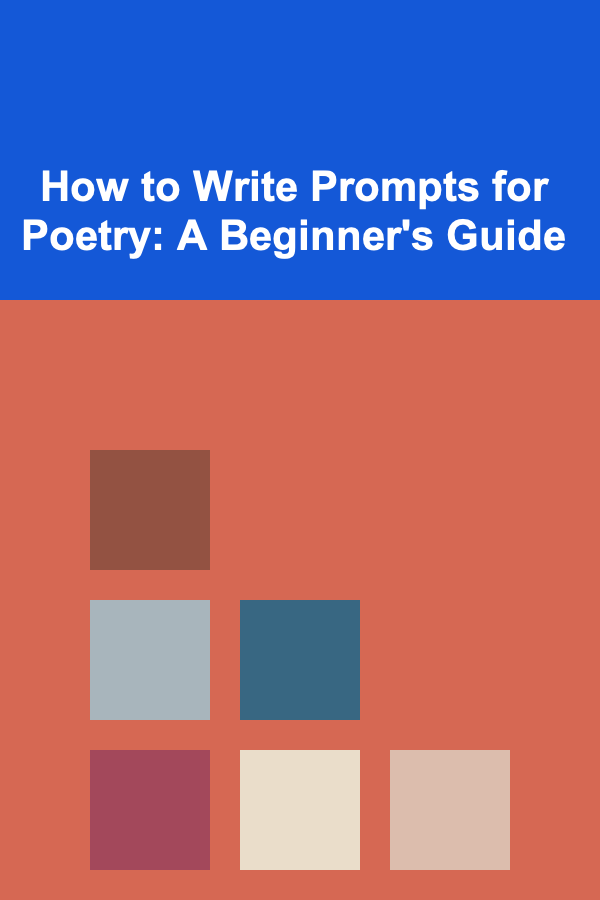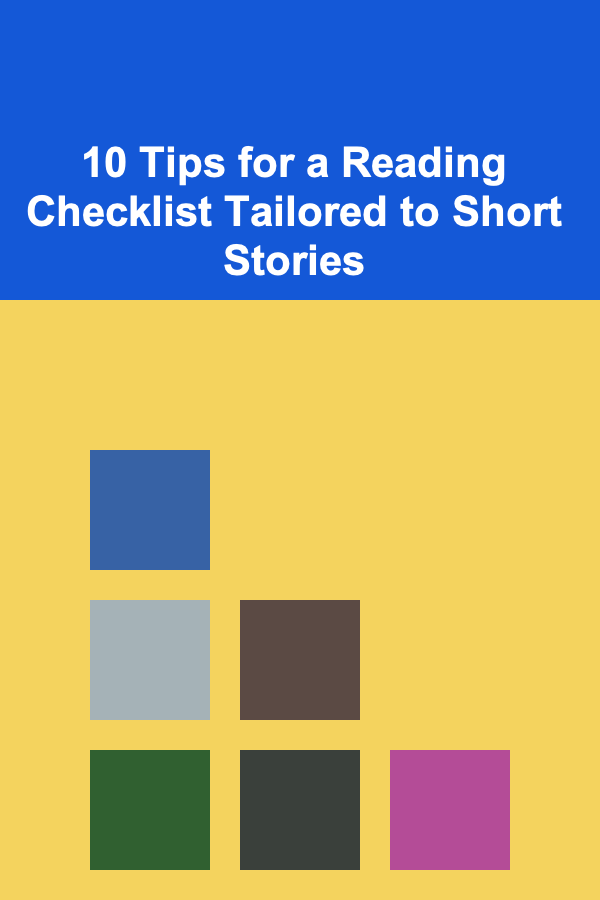
How to Write Prompts for Poetry: A Beginner's Guide
ebook include PDF & Audio bundle (Micro Guide)
$12.99$11.99
Limited Time Offer! Order within the next:

Writing poetry is a creative, expressive act that allows individuals to explore emotions, ideas, and experiences through language. However, for many beginners, the process of crafting poetry can feel daunting, especially when it comes to getting started. One way to overcome this hurdle is by using poetry prompts. Prompts act as a gateway to creativity, providing structure or inspiration to guide the poet's thoughts.
In this beginner's guide, we will explore the art of creating prompts for poetry. Whether you're a novice writer looking to cultivate your creativity or an experienced poet seeking fresh inspiration, the following tips will help you generate compelling poetry prompts that can spark your imagination and enhance your writing skills.
Understanding Poetry Prompts
Before diving into how to create poetry prompts, it's essential to understand what they are and why they are beneficial for poets.
What Is a Poetry Prompt?
A poetry prompt is a suggestion, idea, or phrase that stimulates creativity and provides a starting point for writing poetry. It can be a word, a sentence, an image, a question, or even a concept that invites the poet to explore. Prompts are designed to overcome writer's block, encourage new ideas, and push the boundaries of a writer's imagination.
The Importance of Poetry Prompts for Beginners
For beginners, poetry prompts are a useful tool to:
- Get started: It's often challenging to know where to begin. A well-crafted prompt can provide direction and help break the initial barrier.
- Explore new themes: Prompts can encourage writers to step outside their comfort zones and explore topics or forms they may not have considered before.
- Refine technique: Prompts often challenge writers to experiment with different styles, structures, and literary devices, aiding in skill development.
- Spark creativity: Sometimes, all it takes is a single word or image to unlock a flood of creative ideas that may have been dormant.
The Role of Prompts in Overcoming Writer's Block
One of the most significant challenges any writer, especially beginners, faces is writer's block. The pressure to create something original can be overwhelming. Poetry prompts can alleviate this stress by giving writers something concrete to work with, removing the burden of coming up with a new idea from scratch.
Key Elements to Consider When Writing Poetry Prompts
When crafting poetry prompts, certain elements are important to consider in order to make them effective, stimulating, and useful for beginning poets. Below are some key features of a good poetry prompt.
1. Brevity and Simplicity
Poetry prompts should be clear, concise, and to the point. If a prompt is too lengthy or complicated, it can overwhelm a beginner. The simplicity of a prompt allows the poet to focus on creativity and flow, rather than trying to decipher the prompt itself.
2. Room for Interpretation
An effective prompt allows for multiple interpretations. It should provide enough freedom for the poet to approach the idea in their unique way. A good prompt should inspire creativity without being so specific that it stifles individual expression.
3. Sensory Language
Language that appeals to the senses---sight, sound, taste, touch, and smell---can be incredibly powerful when used in prompts. Sensory language helps to evoke emotions and images in the poet's mind, creating vivid mental pictures and unlocking the potential for strong, evocative poetry.
4. Emotional or Conceptual Depth
Prompts that tap into deep emotions, concepts, or universal themes are more likely to lead to powerful, resonant poetry. Whether it's exploring love, loss, identity, or nature, prompts that touch on core human experiences can produce poetry that is rich and impactful.
5. Clarity in Focus
Though a prompt should leave room for interpretation, it should also provide a sense of focus. A prompt that's too vague may leave a poet unsure of where to begin, while one that is too specific may constrain creativity. Finding the right balance ensures that the poet can dive into the task with confidence.
Types of Poetry Prompts
There are various types of poetry prompts, each offering a different approach to writing. Below, we explore several common types that beginners can use to spark their creativity.
1. Word Prompts
Word prompts are simple yet powerful. They provide a single word that inspires the poet to create a poem based around that word. This type of prompt encourages the writer to explore all the meanings and associations connected to a specific word.
Example Prompts:
- "Lighthouse"
- "Whisper"
- "Eclipse"
- "Journey"
2. Image Prompts
An image prompt involves providing a visual stimulus, such as a photograph or illustration. This type of prompt is designed to evoke imagery and emotions that the poet can then translate into words.
Example Prompts:
- A picture of a sunset over the ocean
- A close-up of a single drop of water on a leaf
- A child playing in the rain
3. Theme-Based Prompts
Theme-based prompts give poets a broad subject to explore, such as nature, love, loss, or time. These themes often evoke deep emotional responses and invite poets to examine their personal experiences or societal issues.
Example Prompts:
- "The passage of time"
- "A forgotten memory"
- "Rebirth after loss"
4. Sentence or Phrase Prompts
A sentence or phrase prompt provides a starting line or fragment from which poets can build their poem. These prompts are especially helpful for writers who need a jumpstart to get their ideas flowing.
Example Prompts:
- "The sky was alive with color, but something was missing."
- "I never told anyone about the night we shared."
5. Question Prompts
Question prompts ask a specific question that the poet must answer or reflect upon in their poem. These prompts encourage introspection and offer a structured approach to creativity.
Example Prompts:
- "What does it mean to belong?"
- "If you could speak to your younger self, what would you say?"
- "How do you define freedom?"
6. Form-Based Prompts
Form-based prompts challenge poets to experiment with different poetry forms, such as haikus, sonnets, free verse, or limericks. These prompts provide a structure that can help poets focus on technical aspects of their writing while still allowing for creativity.
Example Prompts:
- "Write a haiku about autumn."
- "Compose a sonnet about love."
- "Write a limerick about a mischievous cat."
7. Prompt Challenges
Prompt challenges typically involve a series of prompts that the poet must work through in a given time frame. These are often used in workshops or group settings to encourage fast-paced, spontaneous writing.
Example Prompts:
- "Write a poem in five minutes about your favorite season."
- "In three sentences, describe your ideal vacation."
- "Write a poem using only three words: fire, sky, memory."
How to Tailor Poetry Prompts to Your Personal Interests
As a beginner poet, it's important to select prompts that resonate with your personal experiences and interests. Tailoring prompts to your life will make the writing process feel more authentic and connected to your emotional landscape.
1. Draw from Personal Experiences
Many poets find it helpful to draw from their own lives when selecting prompts. For example, you might use prompts that relate to moments you've lived through, such as:
- "The first time I moved away from home."
- "A family tradition you cherish."
- "The day you met your best friend."
2. Explore Your Interests and Passions
Another approach is to focus on your personal interests and passions, such as hobbies, travel, or dreams. For instance:
- "The feeling of standing on a mountain peak."
- "The texture of your favorite book cover."
- "A song that always makes you feel something."
3. Incorporate Literature and Art
If you're passionate about literature, history, or art, you can draw inspiration from these fields. Some examples of prompts might include:
- "Write about a historical event that shaped your worldview."
- "Describe a piece of art that has inspired you."
- "Write a poem in the style of your favorite poet."
Overcoming Common Challenges with Poetry Prompts
While poetry prompts are an excellent tool for getting started, they can sometimes be a bit intimidating or frustrating, especially for beginners. Below are some common challenges and tips on how to overcome them.
1. Feeling Stuck
It's natural to feel stuck at times. If a prompt doesn't inspire immediate creativity, take a break or try looking at it from a different angle. Write down whatever thoughts come to mind, even if they don't seem directly related to the prompt. Often, the act of writing helps spark new ideas.
2. Pressure to Be Perfect
Remember, poetry is a process, and not every poem needs to be perfect. Allow yourself to write freely without judgment. The purpose of using prompts is to help you get your ideas out of your head and onto the page, not to create a final product right away.
3. Overthinking the Prompt
Sometimes, beginners overthink prompts, trying to find the "right" answer. Instead of focusing on making the poem "correct," approach it with an open mind. Let the prompt guide you, but allow yourself the freedom to explore multiple interpretations.
Conclusion
Writing poetry prompts can be a fun and inspiring way to develop your poetic skills and foster creativity. By understanding what makes an effective prompt, experimenting with different types, and personalizing your prompts to suit your own experiences and interests, you'll be well on your way to writing beautiful, thoughtful poetry. Whether you're a beginner or an experienced poet, prompts offer endless possibilities for exploration, reflection, and artistic growth.
Remember, the key is to keep writing and experimenting. The more you practice, the more confident and comfortable you'll become in your ability to write compelling, expressive poetry. So pick up your pen, use a prompt that inspires you, and start writing!
Reading More From Our Other Websites
- [Home Cleaning 101] How to Clean and Maintain Your Home's Baseboards
- [Home Cleaning 101] How to Clean Your Home Without Harmful Chemicals
- [Toy Making Tip 101] Handcrafted Joy: Simple Toy Projects to Gift Your Loved Ones
- [Whitewater Rafting Tip 101] Conquering the Whitewater: A Beginner's Guide to Rafting Rapids
- [Home Maintenance 101] How to Maintain Hardwood Floors to Keep Them Looking New
- [Home Cleaning 101] How to Organize and Clean Your Linen Closet
- [Home Security 101] How to Create a Neighborhood Watch Program for Added Safety
- [Organization Tip 101] How to Create a Stylish Gallery Wall in a Small Home
- [Home Staging 101] How to Leverage Outdoor Spaces with Smart Summer Home Staging Tips
- [Home Renovating 101] How to Incorporate Feng Shui in Your Home Renovation

Affordable and Effective: Budget-Friendly Alternatives for Personal Care Products
Read More
How to Avoid Common Mistakes in Hobby Organization
Read More
How to Pet-Proof Your Home for Safety and Comfort
Read More
How to Reduce Your Waste at Events
Read More
Mastering Talent Management: Advanced Strategies for Driving Organizational Success Through People
Read More
10 Tips for a Reading Checklist Tailored to Short Stories
Read MoreOther Products

Affordable and Effective: Budget-Friendly Alternatives for Personal Care Products
Read More
How to Avoid Common Mistakes in Hobby Organization
Read More
How to Pet-Proof Your Home for Safety and Comfort
Read More
How to Reduce Your Waste at Events
Read More
Mastering Talent Management: Advanced Strategies for Driving Organizational Success Through People
Read More